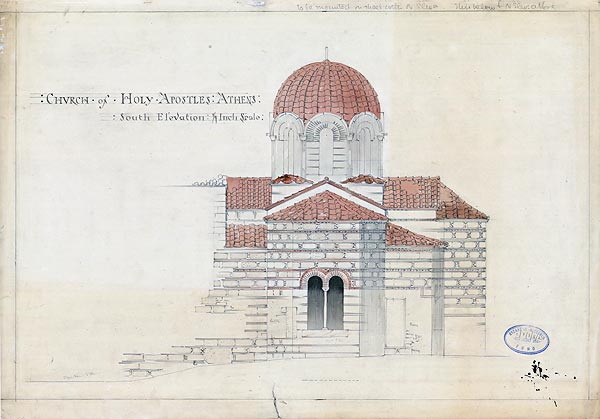About the BRF Collection

The Byzantine Research Fund Archive (BRF) is a unique collection of architectural drawings, photographs and notebooks created from the late 19th century to the middle of the 20th century by a small team of British architects trained in the Arts & Crafts tradition whose studies of Byzantium shaped the Byzantine Revival in later years.
The collection contains over 1,500 drawings and 1,000 photographs, numerous notebooks and the corporate records associated with the Byzantine Research and Publication Fund, the original body created in 1907 to support this work. Although the Fund was associated with the BSA from the time it was founded, it was not until 1937 that the BSA formerly took over the property and operation of it. The BRF Archive contains records of Byzantine monuments in Greece, Turkey, Italy, the Near East, Egypt, and Cyprus. In some cases, the collection contains the only record of a monument before its destruction in modern times, the most important example being the church of Hagios Demetrios in Thessalonike which was almost completely destroyed in the Great Fire of 1917 shortly after being recorded by one of the BRF architects, Walter Sykes George. It also contains personal records of the following architects; Robert Weir Schultz, Sidney Howard Barnsley, Walter Sykes George, William Harvey, Harold Swainson, Peter Gus Corbett, and A.H.S (Peter) Megaw. The aspirations of the BRF Archive Project today are to make these materials accessible to a wide range of researchers.
Distant view of the tower. The photograph is annotated in pencil at the back.
South-west view. The photograph is annotated in pencil at the back.
View of the interior (the surviving frescoes on the vaults and dome). The photograph is annotated in pencil at the back.
South-west view. The photograph is annotated in pencil at the back. The church is called 'Hagia Marina' by Traquair who follows Leake. In fact Hagia Marina is a ruin about a quarter of a mile south-west of the church.
Distant view of the tower. The photograph is annotated in pencil at the back. It has been mislabelled: the name 'Kapitanakides Tower' survives in pencil on the reverse.
View of the belfry. The photograph is annotated in pencil at the back.
Distant view of the castle. The photograph is annotated in pencil at the back.
Distant view of the belfry. The photograph is annotated in pencil at the back.
View of the bridge. The photograph is initialed in pencil at the back. For a negative of the photo see the Hellenic Society negative lot.
View of the bridge. The photograph is initialed in pencil at the back. For a negative of the photo see the Hellenic Society negative lot.
Distant view. The photograph is annotated in pencil at the back.
The synthronon in the east apse. The photograph is annotated in pencil at the back.
General view. The photograph is annotated in pencil at the back.
Causeway to the rock. The photograph is annotated in pencil at the back.
View of the houses in lower town. The photograph is annotated in pencil at the back.
Street in lower town. The photograph is annotated in pencil at the back.
West façade. The photograph is annotated in pencil at the back.
View of iconstand in church. The photograph is annotated in pencil at the back.
View of iconstand in church. The photograph is annotated in pencil at the back.
West façade. The photograph is annotated in pencil at the back.
South-west view. The photograph is annotated in pencil at the back.
Distant view. The photograph is initialed in pencil at the back (A.J.B. Wace). Further annotation in pencil survives.
Entrance to citadel. The photograph is initialed in pencil at the back (A.J.B. Wace). Further annotation in pencil survives.
Closer view of the walls. The photograph is initialed in pencil at the back (A.J.B. Wace). Further annotation in pencil survives.
View from the south-west. The photograph is annotated in pencil at the back.
View from the north-east. The photograph is annotated in pencil at the back.
View of the interior looking north-east. This church is in Christianoupolis, Messinia The photograph is annotated in pencil at the back.
South-east view. The photograph is annotated in pencil at the back. See also photo no: 02/11/23/01 (BRF no: 02/01/15/005).
South-east view. The photograph is annotated in pencil at the back. See also photo no: 02/11/20/02 (BRF no: 02/01/15/004).
View of interior looking east. The photograph is annotated in pencil at the back.
Fresco icon (the Virgin with Child) and frame (left pilar of the iconostasis). The photograph is annotated in pencil at the back.
Fresco icon (Enthroned Christ) and frame (right pilar of the iconostasis). The photograph is annotated in pencil at the back.
Detail of apse fresco (Two HierarcH.S.). The photograph is annotated in pencil at the back. See also photo no. 02/11/12/27/01 (BRF no 02/01/15/10).
Detail of apse fresco (Two HierarcH.S.). The photograph is annotated in pencil at the back. See also photo no. 02/11/12/26/01 (BRF no 02/01/15/9).
Distant view. The photograph is annotated in pencil at the back.
Distant view of the castle from the coastline. The photograph is annotated in pencil at the back.
View of the interior (the columns). The photograph is annotated in pencil at the back.
Distant view. The photograph is annotated in pencil at the back. Created by Caton?(donor), R C
Close view of cave-church. The photograph is annotated in pencil at the back. Created by Caton?(donor), R C
Distant view. This is a Hellenic Society photograph (H.S. 2911). It is initialed (F.W.H.) and annotated in pencil at the back.
Distant view. This is a Hellenic Society photograph (H.S. 2912). It is initialed (F.W.H.) and annotated in pencil at the back.
Distant view. This is a Hellenic Society photograph (H.S. 2913). It is initialed (F.W.H.) and annotated in pencil at the back.
Close view of the towers. This is a Hellenic Society photograph (H.S. 2914). It is initialed (F.W.H.) and annotated in pencil at the back.
Close view of the towers. This is a Hellenic Society photograph (H.S. 2915). It is initialed (F.W.H.) and annotated in pencil at the back.
Coats of arms in town. This is a Hellenic Society photograph (H.S. 6147). It is annotated in pencil at the back with the name of the creator/donor.
Distant view. This is a Hellenic Society photograph (H.S. 6143). It is annotated in pencil at the back with the name of the creator/donor, Caton, R (?).
Annotated in ink on the back, 'View of Castro with medieval wall, Naxos. Catholic cathedral just visible on the ...Orthodox cathedral in the foreground'
Distant view. The photograph is annotated in ink at the back.
South façade. The photograph is annotated in ink at the back.
Detail of door decoration. This is a Hellenic Society photograph (H.S. 2826). It is initialed (A.J.B.Wace) and annotated in pencil at the back.


